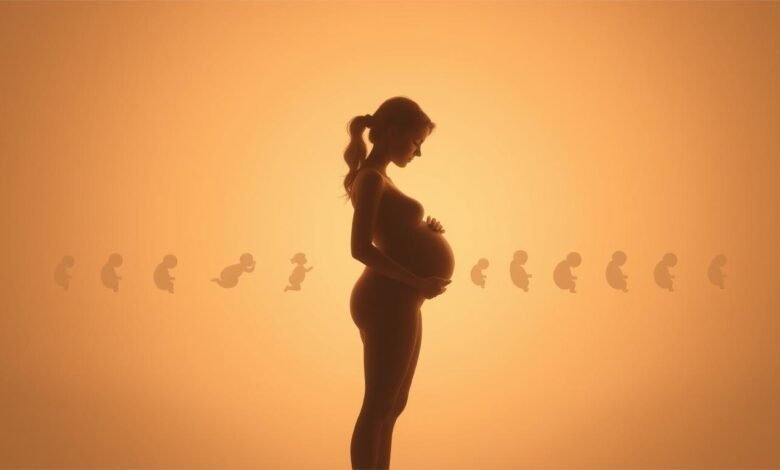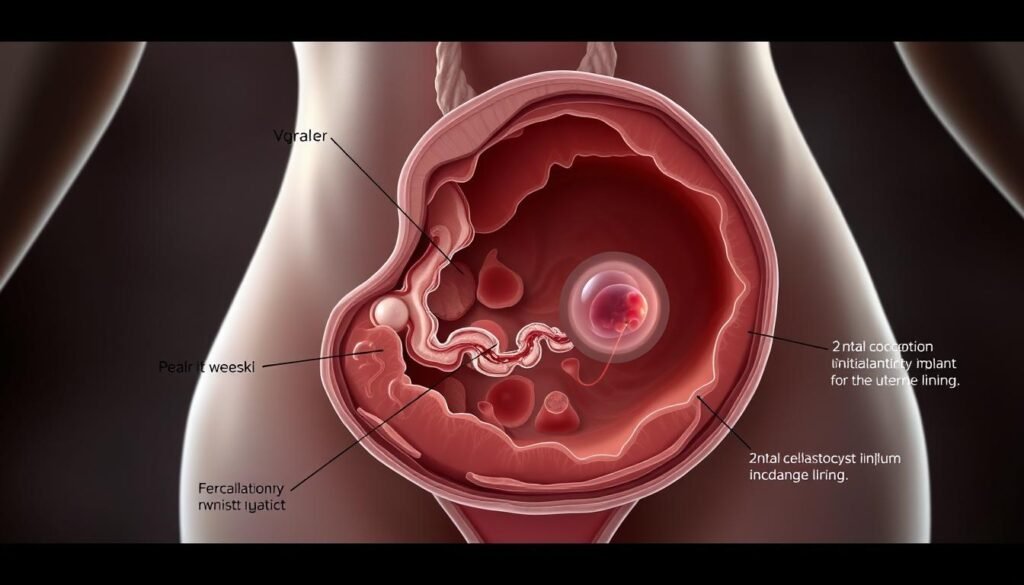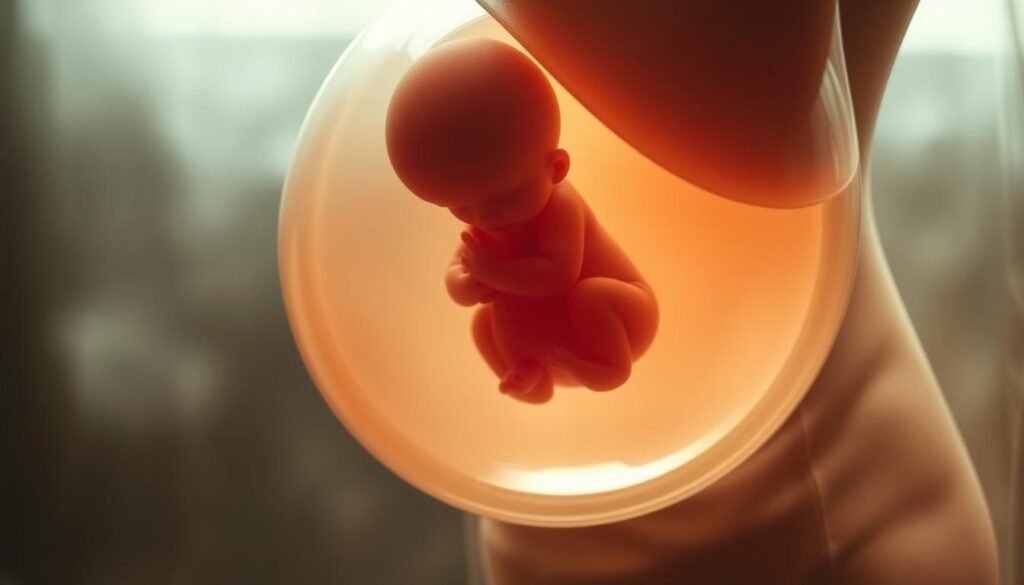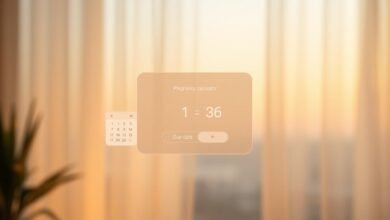Pregnancy Week by Week: What to Expect Each Step

Understanding your pregnancy week by week helps you track every milestone, from conception to delivery. Each week brings new changes in your body and your baby’s growth. By knowing what to expect, you’ll feel more confident, calm, and ready to enjoy this special journey.
Starting this amazing journey, you might wonder what’s next. Pregnancy is full of changes, both physical and emotional. Knowing what to expect each week can make you feel more ready and in charge.
You’ll hit many milestones, from fertilization to your baby’s birth. By week 12, your baby will be as small as a lime and start showing reflexes. You’ll learn about prenatal care, nutrition, and managing symptoms. We aim to give you the info and support you need, covering pregnancy development, fetal growth, and more.
Introduction: What Lies Ahead
Starting your journey is a big step. Tracking pregnancy progress helps you feel more in control. Pregnancy is split into three trimesters, each with its own changes.
Each trimester brings big changes. Knowing the prenatal care timeline and tracking progress prepares you for these changes. This way, you can make smart choices for a healthy pregnancy.
Learning about your pregnancy trimesters and tracking pregnancy progress is key. It’s a thrilling time, and knowing what to expect helps you feel confident.
Every pregnancy is different. It’s important to be flexible and adjust to each trimester’s changes. By tracking pregnancy progress and understanding the prenatal care timeline, you’ll be ready for anything.
First Trimester Overview: Weeks 1-12
Starting this amazing journey, it’s key to know what to expect in the first trimester. This time is vital for baby growth week by week. Knowing what happens can help you get ready for the changes. Use a pregnancy week by week guide to follow your journey and learn about pregnancy symptoms by week.
In the first trimester, you’ll see big changes in your body and feelings. Morning sickness, tiredness, and mood swings are common pregnancy symptoms by week. Drinking plenty of water, eating well, and doing light exercise are good for a healthy pregnancy.
Using a pregnancy week by week guide helps track your baby growth week by week. It lets you spot any problems early and get the best care. Being informed and ready makes for a healthy and joyful pregnancy.
Key Developments in the First Trimester
The first trimester is when your baby grows fast. By week 12, your baby’s major organs and systems are formed. The risk of miscarriage also goes down a lot.
Common Symptoms to Expect
Expect morning sickness, tiredness, and mood swings in the first trimester. Drinking lots of water, eating right, and doing light exercise can help with these symptoms.
Tips for a Healthy First Trimester
To have a healthy first trimester, eat well, drink plenty of water, and do light exercise. Avoid tight clothes, stay cool, and elevate your legs to prevent varicose veins. By following these tips and using a pregnancy week by week guide, you can have a happy and healthy pregnancy.
Week 1: Conception and Early Changes
When you start tracking pregnancy progress, you might not see big changes right away. Most people don’t feel any pregnancy symptoms in week 1. But, some might feel mild cramps, tender breasts, or get really tired a few days after getting pregnant.
Remember, every pregnancy is different. Pregnancy development and 
What Happens During Week 1nConception usually happens about 14 days after a typical 28-day menstrual cycle starts. Implantation starts about 5-6 days after conception. This is when the fertilized egg sticks to the uterine lining.nnPregnancy Symptoms You Might Not NoticenSome people might feel early pregnancy symptoms like mild cramps, tender breasts, or tiredness a few days after getting pregnant. These symptoms can be mild and not everyone notices them. As you keep tracking pregnancy progress, you’ll start to feel the changes in your body more.
Week 2: Preparing for Ovulation
As you start week 2 of your pregnancy week by week journey, your body is getting ready for ovulation. This is a key time for pregnancy development. The fertilized egg will start its way to the uterus. You might not see big changes yet, but your body is changing in small ways to help your baby grow.
It’s important to think about fetal growth stages and take care of your health. Take prenatal vitamins with at least 400 micrograms of folic acid every day. This can help prevent some birth defects. Also, doing things that help you relax can make it easier to get pregnant and have a healthy pregnancy.</p>
Remember, you’re not alone in this journey. Many women have had healthy babies. By living a healthy lifestyle, staying informed, and getting help when you need it, you can have a positive experience. Keep following along for more on <em>pregnancy week by week and fetal growth stages to get ready for this amazing adventure.
Week 3: Fertilization and Implantation
As you’re tracking pregnancy progress, you’re probably curious about week 3. This is a thrilling time, with fertilization and implantation happening. The fertilized egg, now called a zygote, starts dividing and growing into a blastocyst. This usually happens 6-10 days after ovulation.
Knowing the prenatal care timeline is key during this time. Your healthcare provider will help you with the steps for a healthy pregnancy. It’s important to learn about the <em>pregnancy trimesters and what to expect in each one.
In week 3, the blastocyst implants itself into the uterine lining, a process that takes a few days. Some women might see implantation bleeding, which is usually light and brief. As the embryo grows, it starts making hCG, a hormone that keeps the pregnancy going.</p>
Drinking plenty of water is vital during pregnancy to help your baby grow. Aim for 8-12 glasses of water a day. As you keep <em>tracking pregnancy progress, you’ll notice changes in your body and your baby’s growth.
Week 4: Missed Period and Testing
At week 4, you might notice changes in your body. A missed period is a common sign of pregnancy. You could also feel nausea, cramping, and be very tired. <em>Pregnancy symptoms by week can differ, but these are common early signs.</p>
Ho
me pregnancy tests can show pregnancy after about 3.5 weeks. They are very accurate, with a 99% success rate. If you think you might be pregnant, take a test and talk to your doctor. They can give you a <em>pregnancy week by week guide to help you understand what’s happening.
<p>Every pregnancy is different, and not all women feel the same symptoms. But, a pregnancy week by week guide can keep you informed and ready for what’s coming. Stay tuned for more updates on your pregnancy. And don’t hesitate to ask if you have any questions or worries.
Weeks 5-8: Rapid Development in the Embryo
Weeks 5-8 of pregnancy development</em> bring big changes for you and your baby. This time is key for fetal growth stages. It’s important to track your pregnancy to keep it healthy.
Your baby’s heart beats fast, and their limbs start to form. The neural tube, which will become the brain, spinal cord, and backbone, is also forming. The placenta and amniotic sac grow, giving your baby food and a safe place.
You might feel morning sickness, tiredness, and mood swings because of hormones. Taking care of yourself is vital during this time. Eating well and seeing your doctor regularly helps your baby grow.
Every pregnancy is different. It’s important to stay informed and talk to your healthcare provider. By tracking pregnancy progress</em> and going to check-ups, you’re ready for any challenges. This way, you can have a healthy and happy pregnancy.</p>
Wee
ks 9-12: Entering the Fetal Stage</em>
As you enter weeks 9-12 of your pregnancy week by week</em> journey, you’re likely to experience significant pregnancy development</em> and fetal growth stages. This period is key, and you’ll see your baby grow fast. By week 9, your baby is about the size of a peanut, and by week 12, they’ve grown to about 2.5 inches long.
During this time, your baby’s fingers and toes become distinct, and their heart is fully formed and beating at around 180 beats per minute. You may also start to notice changes in your body, such as faster hair growth, oily skin, and acne, due to hormonal changes.
It’s essential to attend your first antenatal care appointment by 12 weeks, where you’ll have the opportunity to discuss your pregnancy development</em> and any concerns you may have. You may also have your first ultrasound scan between 8 and 14 weeks, which will give you a glimpse of your baby’s growth and development.
| Week | Baby’s Size | Key Developments |
|---|---|---|
| 9 | 0.70 inches (peanut size) | Distinct fingers and toes |
| 10 | 1 inch (green olive size) | Heart fully formed and beating |
| 11 | 2 inches (strawberry size) | Recognizable profile |
| 12 | 2.5 inches (garlic bulb size) | Fully formed organs, muscles, limbs, and bones |
By the end of week 12, you’ve completed the first trimester, and the risk of miscarriage decreases significantly. It’s an exciting time, and you’re one step closer to meeting your baby.
Second Trimester Overview: Weeks 13-26
Entering the second trimester, you might feel a mix of emotions. You’re excited, anxious, and eager to see what’s next. This period, from week 13 to 26, is key for tracking pregnancy progress and following a prenatal care timeline. You’ll see big changes in your body and your baby’s growth, so it’s important to know what to expect.
Your baby will grow fast, and you might start to feel their movements. Regular prenatal care appointments are vital to track your baby’s growth and tackle any worries. Eating well and exercising regularly support your baby’s growth and your health.
 alt=”second trimester pregnancy” />
alt=”second trimester pregnancy” />
Every pregnancy is different, so it’s important to be flexible and adapt to changes. By following your prenatal care timeline and tracking pregnancy progress, you’ll be ready for the ups and downs. Stay positive and reach out to your healthcare provider if you have questions or concerns about your pregnancy trimesters.
Week 13: The End of the First Trimester
At 13 weeks pregnant, you’re almost at the end of your first trimester. This is a big milestone in your week by week guide. Your baby is growing fast, and you might feel more energetic and confident. This is a sign you’re moving into the second trimester well.
It’s important to know about pregnancy symptoms by week now. You might feel round ligament pains, mood swings, or darkened skin patches. But remember, every pregnancy is different. A pregnancy week by week guide can help you understand what’s happening and make good choices for your health and your baby’s.
As you start the second trimester, you’ll see big changes in your body and your baby. Your baby is now about 7.4 cm long, like a peach. It’s an exciting time. With the right help, you can feel confident on this journey. Drink plenty of water, eat well, and exercise to support your health and baby growth week by week.
By staying informed and listening to your body, you’ll be ready for the ups and downs of pregnancy. Remember, every woman’s experience is different. It’s key to listen to your body and get medical advice if you’re worried. With the right attitude and support, you can enjoy this amazing journey and can’t wait to meet your baby.
Week 20: The Midpoint of Pregnancy
At 20 weeks pregnant, you’re halfway through your pregnancy journey! This is an exciting time, as you’ll start to feel your baby move and experience significant pregnancy development. Your baby has doubled in weight over the last two weeks and is now about 7.75 inches long. The heart of your baby pumps approximately 100 pints of blood per day, and their length increases to about 9.25 inches by this time.
As you track your progress, you’ll notice changes in your body. Your uterus is about the size of a cantaloupe, and your heart works 40% to 50% harder to support your pregnancy. You may have gained about 33% of your total weight by now. It’s essential to stay healthy and active during this time, as regular exercise can reduce the incidence of lower back pain and other discomforts.
Now is also the time to prepare for the anatomy scan, which is typically scheduled between 18 and 22 weeks of pregnancy. This scan will give you a glimpse of your baby’s growth and development, and you’ll be able to see their tiny features. The anatomy scan ultrasound lasts approximately 30 to 45 minutes and is a key part of fetal growth stages tracking.
Remember to take care of yourself during this time, eating a balanced diet and staying hydrated. With the right care and attention, you’ll be able to enjoy this special time and look forward to meeting your baby soon.
Week 26: Approaching the Third Trimester
As you get closer to the third trimester, you might feel a mix of feelings. You could be excited, nervous, or just waiting to see what happens. At 26 weeks, your baby is about the size of a cucumber, measuring 35.6 cm from head to heel.
This time is key for fetal growth stages. You’ll start to see big changes in your body and your baby’s growth. It’s a special time.
Your pregnancy week by week journey is unique. It’s important to know what to expect. Your baby’s senses are getting stronger, and they can see light and hear sounds. You might also feel leg cramps, often at night.

Getting ready for the third trimester is important. Focus on your pregnancy development and your baby’s growth. Make sure to keep up with your prenatal care, including vaccinations and check-ups.
By knowing what to expect, you’ll be ready for the ups and downs of pregnancy week by week.
Conclusion: Your Journey
As we wrap up our guide, take a moment to think about your amazing pregnancy journey. From the start to the end, it shows how strong and amazing our bodies are.
Reflecting on Progress and Changes
Whether it’s your first time or not, tracking your pregnancy has been key. It helps you understand each stage of your journey. Enjoy the changes in you and your baby, and remember, you’re not alone.
Final Thoughts and Resources to Support You
Every pregnancy is unique, and what works for one might not work for another. Trust yourself, listen to your healthcare team, and reach out to loved ones. There are many trustworthy resources out there, like websites and apps.
As you near the end, know you’re stronger and more resilient than you think. Wishing you a peaceful and joyful end to your pregnancy journey. You’re doing great!
Understanding your pregnancy week by week gives you power and peace of mind. Every stage of pregnancy brings new emotions, changes, and milestones that shape your journey as a mom. From the very first signs of pregnancy to the final weeks before birth, staying informed helps you make the best choices for you and your baby.
Each week, your body adjusts to nurture new life — a process that’s both beautiful and challenging. Remember, it’s normal to experience ups and downs. Whether it’s excitement, anxiety, or just curiosity about what comes next, your feelings are valid and part of the journey.
By following your pregnancy week by week progress, attending check-ups, and keeping a healthy lifestyle, you’re already giving your baby the best start. Don’t forget to care for yourself too — rest, eat well, and stay connected to loved ones.
Pregnancy is not just about growing a baby; it’s about growing into motherhood. Each week brings you closer to meeting your little one, and every moment counts. Embrace the journey, celebrate the milestones, and trust that you’re doing amazing.






2 Comments